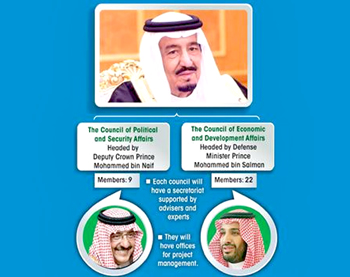Jeddah, Feb 10: The two new councils set up by Custodian of the Two Holy Mosques King Salman last month have been given stringent mandates to formulate and implement the country’s political, security and economic policies, the Cabinet announced on Monday.

The Council of Political and Security Affairs and the Council of Economic and Development Affairs would “identify various trends, visions and goals” and “follow up their implementation and coordination,” the Minister of Culture and Information Adel Al-Toraifi said in a statement.
At its weekly meeting on Monday chaired by King Salman, the Cabinet decided that each council would have a secretariat supported by advisers and experts. They would also have offices for project management to verify whether parties are committed to implementing strategies and plans.
King Salman had announced in January that the Council for Political and Security Affairs would have nine members and be chaired by Prince Mohammed bin Naif, second deputy premier and interior minister. The 22-member Council for Economic and Development Affairs would be chaired by Prince Mohammed bin Salman, the defense minister, the king had ordered.
Meanwhile, the Cabinet expressed its concern at developments in Yemen, which it said is a threat to the security of that country and the region. The Cabinet said that the action was a coup and contrary to international resolutions related to Yemen, the Gulf Initiative adopted by the international community, and the Yemeni national dialogue.
The Cabinet reiterated the Kingdom’s stand against “all extremist ideologies and terror organizations” and “condemnation of the savageries” committed by the Islamic State group, particularly the murders of a Jordanian pilot and two Japanese hostages, Al-Toraifi said in a statement to the Saudi Press Agency following the meeting.






Comments
Add new comment